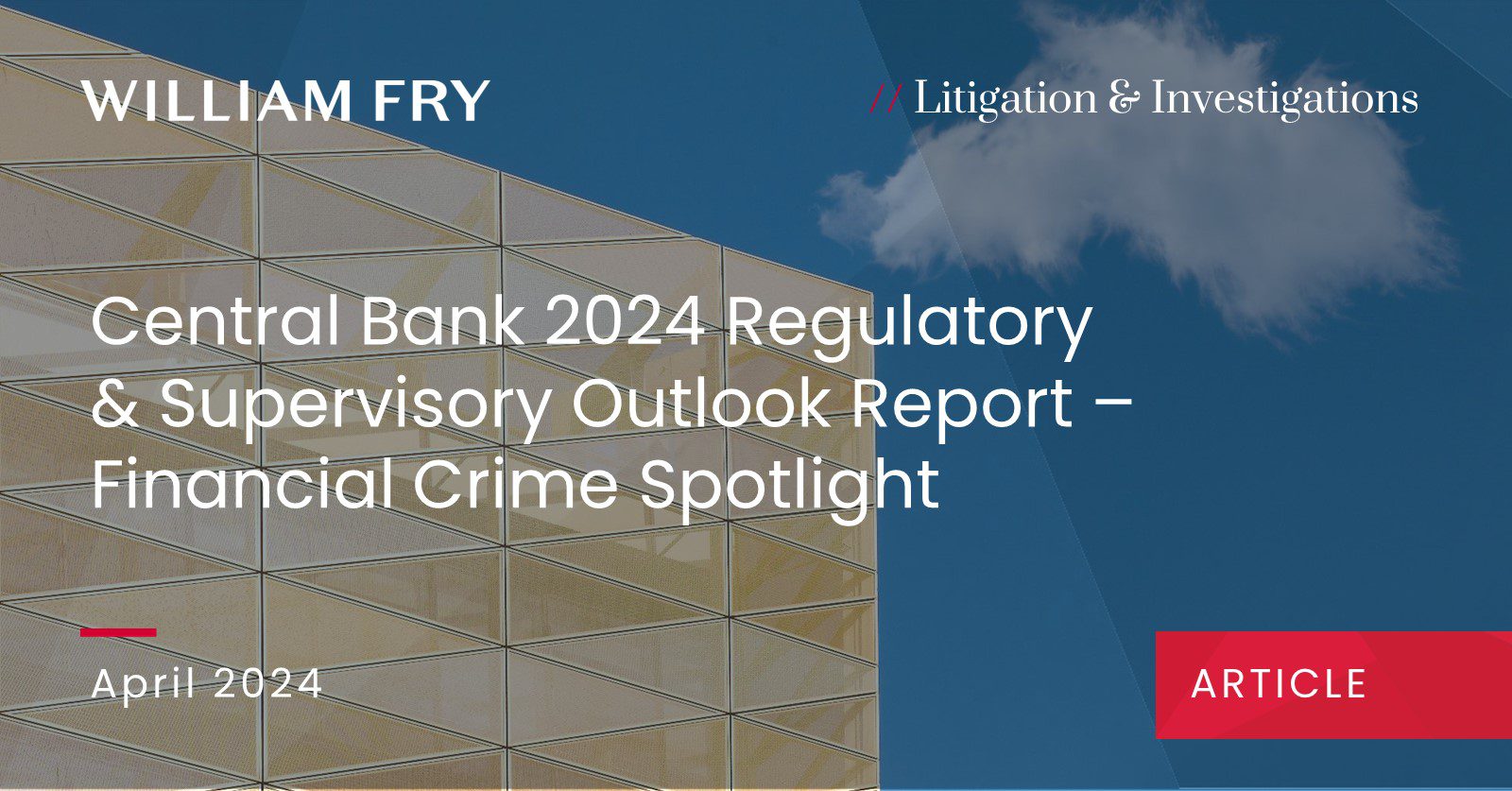The Central Bank of Ireland (Central Bank) recently published its 2024 Regulatory & Supervisory Report (Report).
See our recent article detailing key aspects of the report here. The Report describes financial crime as involving the abuse of the financial system by criminal actors. Areas of financial crime risk that fall under the Central Bank’s regulatory mandate and to which the Central Bank has specific responsibilities include money laundering (ML), terrorist financing (TF), fraud, financial sanctions evasion, market abuse and the unauthorised provision of financial services.
The Central Bank has wide-ranging responsibilities in the prevention of financial crime. It is one of three national competent authorities for the administration of financial sanctions, which are restrictive measures under the EU’s Restrictive Measures regime imposed on natural and legal persons to curtail their activities and to exert pressure and influence on them. The Central Bank also investigates market abuse and the unauthorised provision of financial services.
The Central Bank works closely with law enforcement, other State agencies, domestic supervisors, and peer regulators. Where it identifies criminal activity taking place in the financial system, it works with An Garda Siochána and other agencies that lead criminal investigations and prosecutions.
Risk Exposure
The Report notes that Ireland is exposed to financial crime risks on a domestic and international level. The mitigation of these risks relies on firms being aware of the risks faced and having robust risk management frameworks to identify and mitigate them.
The following are identified in the Report as the key elements and drivers of financial crime risk:
- Money Laundering and Terrorist Financing
Ireland is exposed to both ML and TF in its domestic economy as well as by criminals outside the State. ML and TF are complex areas that require a whole-of-system approach. Regulatory authorities, law enforcement and industry all need to collaborate to understand the threats and vulnerabilities and the priority areas for focus. ML and TF typically involve the transfer, concealment or conversion of the proceeds of crime. Therefore, anti-money laundering (AML) measures are key to preventing financial crime.The Report identifies retail-facing sectors as critical areas for the functioning of the system and the economy. As these sectors often act as a gateway to the financial system, they present heightened financial crime risks that need to be mitigated. Organised crime gangs engaged in transnational criminal activity often launder the proceeds of crime using corporate entities and abuse financial services to place and transfer funds. - Fraud
Fraud risk has increased in recent years with technological advances, exposing firms, consumers, businesses, and the wider financial system to harm. The proliferation of online fraud and scams causes significant harm to consumers and undermines the integrity and confidence of the financial system. No demographic group is immune from the risks posed. According to the Report, whilst international cooperation with other agencies is key, the retrieval of stolen funds can be challenging, making preventative measures and vigilance critical to mitigate the risks. - Market Abuse
The increased scale and sophistication of securities market activity in the Irish financial sector results in the continued exposure of the financial market to all types of market abuse. Higher trading volumes, more automated trading processes and higher levels of order cancellation increase the potential for market abuse and difficulty in detecting these activities. - Financial Sanctions
The geopolitical landscape has shifted in recent years and is reflected in the nature and scale of financial sanctions introduced.Like other areas of financial crime, the Irish financial system and firms operating in it are exposed to increased sanctions risks. This is particularly the case given Ireland is an open economy and has a large internationally facing financial services sector. One of the main risks is the circumvention of EU financial sanctions, which is a criminal offence with serious consequences, not only for the firm or individuals concerned, but also for the reputation of the wider system.
Key Activities in 2024/2025
The Central Bank will continue to apply a risk-based approach to prevent financial crime. Specific activities highlighted for 2024/25 include:
- AML/CFT supervision
- Ensure the highest risk entities have effective AML / countering the financing of terrorism (CFT) control frameworks in place;
- Thematic supervision across sectors focusing on firms’ ML/TF risk assessment arising from international money flows and the appropriateness of their control frameworks; and
- Further enhancements to the Central Bank’s data collection and analysis from its Risk Evaluation Questionnaires, resulting in bespoke questionnaires for sectors. This will require firms to submit more quantitative data that will be used to determine the risk rating of firms and sectors.
- Financial sanctions
- Maintain the Central Bank’s focus on implementing EU financial sanctions through working with other competent authorities and agencies, assessing derogation requests, and engaging with entities on their financial sanctions control frameworks.
- Market abuse
- Focus on the requirement for firms to report suspicious orders and transactions to the Central Bank without delay, building on its extensive communication to the financial services industry in recent years on market abuse obligations and the Central Bank’s priorities;
- Enhance the Central Bank’s surveillance of the market and extend surveillance across multiple trading venues, including working with other National Competent Authorities and ESMA;
- Focus on improving the extent and quality of suspicious transaction and orders reporting (STORs); and
- Enhance the Central Bank’s approach to the analysis, investigation, and enforcement of suspected market abuse.
- Fraud
- Proactively detect, filter and triage suspected online fraud and scams and help disrupt these activities;
- Intensify cooperation and collaboration with other agencies (for example, An Garda Siochána, the Competition and Consumer Protection Commission and Coimisiún na Meán) and technology firms, to combat fraud in financial services;
- Proactive and targeted communications to consumers and the wider public on fraud and the unauthorised provision of financial services. This will build greater awareness of fraud and scams and the need for heightened vigilance; and
- Further develop the Central Bank’s technology capabilities to improve its surveillance of social media to identify potential abusive practices.
Conclusion
The Report identifies financial crime as a key risk facing the regulated financial sector. Financial services providers need to be aware that the Central Bank will be strengthening its regulatory and supervisory role in AML/CTF, financial sanctions, market abuse, and fraud.
The Governor of the Central Bank, on the publication of the Report, remarked that leaders of firms in the financial system are expected to adopt “a proactive, consumer-centric and forward-looking approach” to risk management. The risk outlook and supervisory priorities of the Central Bank set out in the Report for 2024, together with the Spotlight on financial crime, will assist firms in knowing what to expect in terms of the Central Bank’s focus for the year ahead.
For any more information, please contact Hilary Rogers, Joanne Ryan or your usual William Fry contact.



